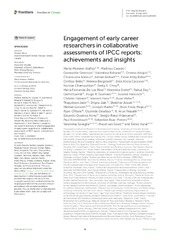Engagement of early career researchers in collaborative assessments of IPCC reports: achievements and insights
Autores
Moreno-Ibáñez, Marta | Casado, Mathieu | Gremion, Gwenaëlle | Rabanal, Valentina | Adojoh, Onema | Anoruo, Chukwuma | Arshad, Adnan | Attig Bahar, Faten | Bello, Cinthya | Bergstedt, Helena | Caccavo, Jilda Alicia | Champollion, Nicolas | Choy, Emily S. | De Los Ríos, María Fernanda | Detlef, Henrieka | Dey, Rahul | Gamal, Gamil | Guímaro, Hugo R. | Hancock, Susana | Hansen, Christel | Hare, Vincent | Höfer, Juan | Jabir, Thajudeen | Jain, Shipra | Jawak, Shridhar | Latonin, Mikhail | Martin, Joseph | Mojica, Jhon Fredy | O’Hara, Ryan | Onafeso, Olumide | Prasath, R. Arun | Queiroz Alves, Eduardo | Raez-Villanueva, Sergio | Rosenbaum, Paul | Ruiz-Pereira, Sebastián | Savaglia, Valentina | van Soest, Maud | Vural, Deniz

Resumen
The participation of a diverse –in terms of geography, discipline and gender– group of Early Career Researchers (ECRs) in the peer review process can help alleviate the workload of senior researchers and counteract the perceptual biases that the latter tend to show. Moreover, ECRs can benefit from developing skills that are often not included in educational programs. From 2018 to 2021, the Association of Polar Early Career Scientists, in collaboration with other associations, organized six group reviews of the Intergovernmental Panel on Climate Change (IPCC) reports by a total of more than 600 ECRs from over 70 different countries.
This study aims to evaluate this group review in terms of its contribution to the production of scientific knowledge, and as a career development opportunity for ECRs. The data analyzed consists of application forms, review comments, and feedback surveys that were collected during each review process. The results of this study show that, overall, the group reviews were a success in terms of the experience of ECRs and their contribution to the peer review of the IPCC reports. Most survey respondents considered the general organization of the group reviews satisfactory and expressed interest in participating in future group reviews. However, most participants did not engage in discussions with their peers, which constitutes a missed opportunity to engage in active learning and the shared production of knowledge. ECRs made a significant contribution to the review of the IPCC reports by producing an average of 2,422 ± 532 comments per group review, 36% of which were substantive. PhD students were shown
to be as proficient reviewers as postdoctoral researchers and faculty reviewers. More importantly, the diversity of reviewers in terms of geography and discipline, together with the fact that they are ECRs, can help produce more balanced scientific reports since they bring new perspectives, thus counteracting the biases that senior researchers have. These group reviews could be improved by providing more comprehensive training and facilitating communication among reviewers so that they can engage in meaningful exchanges. We conclude that the IPCC should formalize the inclusion of ECRs in future reviews of the IPCC reports.
La participación de un grupo diverso (en términos de geografía, disciplina y género) de jóvenes científicos (ECRs) in el proceso de "peer review" puede ayudar a aliviar la carga de trabajo de los investigadores más experimentados y contrarrestar los sesgos que éstos tienden a mostrar. A su vez, los jóvenes científicos pueden beneficiarse del desarrollo de habilidades que usualmente no son incluidas en los programas educativos. Entre 2018 y 2021, la Asociación de Jóvenes Científicos Polares (APECS, por sus siglas en inglés), en colaboración a otras organizaciones, llevaron a cabo seis revisiones grupales de los reportes del Panel Intergubernamental de Cambio Climático (IPCC, por sus siglas en inglés), en los que participaron más de 600 jóvenes científicos de más de 70 países.
Este trabajo busca evaluar la revisión grupal en términos de la contribución en la producción de contenido científico y en la oportunidad de desarrollo de la carrera de los jóvenes científicos. Esta información analizada consiste en los formularios de aplicación, los comentarios y las encuestas post-revisión que se realizaron para cada proceso de revisión.
Cita
Colecciones
Fecha
2024-07Metadatos
Mostrar el registro completo del ítemUtilice este identificador (URI) para citar o enlazar este item
http://hdl.handle.net/20.500.12160/2827El ítem tiene asociados los siguientes ficheros de licencia: